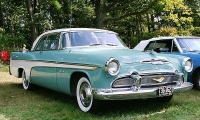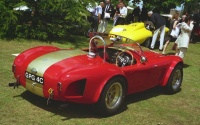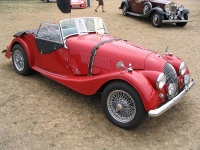Chapter 17
- Please keep these annotations SPOILER-FREE by not revealing information from later pages in the novel.
Page numbers refer to editions with 369 pages, where the story begins on page 1. Not sure if there are other editions with variant pagination. Please let us know otherwise.
Contents
Page 297
Hermosa . . . Lighthouse
The Lighthouse is/was a famous jazz club, especially in the 1950s. The bassist Howard Rumsey led the house band The Lighthouse All-Stars.
Page 298
Bud Shank
Jazz musician, arranger, and composer, most well known as an alto sax player. Associated with the LA jazz scene since working with Stan Kenton in the 1950s. Also played flute and tenor sax. The famous alto flute solo on The Mamas and the Papas' 1965 hit "California Dreamin'" is his. Died April 2, 2009, several months before Inherent Vice was published, so this reference may be a last-minute tribute added by Pynchon. Shank's [webpage http://www.budshankalto.com/] is maintained by the LA Jazz Institute in his honor.
Page 298

1956 DeSoto
1956 DeSoto Firedome driven by Scottie Ferguson (James Stewart) in the 1958 Alfred Hitchcock classic Vertigo.

Cobra 289
Morgans from the showroom up in Westwood with hoods held down by leather straps
Page 299
"Drac's a part of the band"
Reference to the 1962 hit single "Monster Mash," recorded originally by Bobby "Boris" Pickett (1938-2007) and the Cryptkickers, and covered by the Beach Boys (1964) and by the Bonzo Dog Doo Dah Band on Tadpoles and in 1968 performed it on the British television series Do Not Adjust Your Set - ("Now everything's cool / Drac's a part of the band / and my monster mash is the hit of the land..."). Have a listen on YouTube...
Interstellar Overdrive
Psychedelic rock classic. Youtube. Possible joke here on 'overdrive' since the distance from the intersection of Pier Avenue and the Pacific Coast Highway to LAX is around six miles. Sure, the song is long, about ten minutes, but Doc would have to be speeding like crazy, which isn't mentioned, to make that mileage with time still left on the song. At any rate, significant distance and/or time are casually covered and I'm going with mysterious power of interstellar overdrive giving them a helping hand. "Ooo-ooo woo-oo, woo-ooo."
Virbrasonic
Possibly the Motorola unit used to add reverb. Little more info. You be the judge if it looks so large as to take up half a trunk.
Page 300
tempt the hand of fate
A line from "Tears on My Pillow," included in the page of songs mentioned in the book. The lyric, in context:
- "If we could start anew
- I wouldn't hesitate
- I'd gladly take you back
- And tempt the hand of fate."
Page 301
reading Herbert Marcuse and Chairman Mao
In other words, learning how to be a leftist, neo-Marxist Communist.
- Mao Zedong, aka "Chairman Mao" led the Communist Party of China and was the leader of the People’s Republic of China from its establishment in 1949 until his death in 1976.
- Herbert Marcuse was a philosopher, critical theorist, and member of the neo-Marxist Frankfurt School, which is known for its critique of capitalism. He was popular among student radicals in the 1960s.
Page 303
an enlarged photo of a gigantic monster wave at Makaha last winter with a tiny but instantly recognizable Greg Noll cradled in it like a faithful worshiper in the fist of God.
Apparently there is no photo of Greg Noll successfully riding what was then, December 1969, considered to be the biggest wave ever paddled into. There is, however, a painting made after the event here that looks similar to the one Pynchon described, but probably, I couldn't verify a date, made years after 1970. Noll would have been so easily recognized because he rode with a wider than normal stance, and in black-and-white stripped shorts, as seen in this famous surfing picture. Oh, nice Youtube clip about Noll riding Makaha that makes the event sound more than a little Pynchon-esque. Lot of info and links, I know, but this is a huge deal in surfing history.
Page 310
something about Jan gets a wig
This accurately describes an episode of The Brady Bunch entitled "Will the Real Jan Brady Please Stand Up?" The episode first aired on January 15, 1971.
Page 311
'You're too short for that gesture.'
Line said by George Sanders in "All About Eve."
Youtube clip, about 3:55 in, worth seeing to give the odd line some context.
Page 314
Courage, Camille
The same line - set in type the same way, with "Courage" italicized - appears at page 345 of "Against the Day." The reference is discussed in the Against the Day wiki.
Later they went outside
As noted earlier,
Pynchon has inserted a day in between Monday, May 4, 1970 and Tuesday, May 5. This day runs from the middle of Chapter 16 to the the end of chapter 17, a total of 34 pages, making it the day with the most pages in the book.
The phrase used to introduce the inserted day - "next day was as they say another day - echoes a phrase used earlier, thus connecting the day on which Doc learns the names of those responsible for the murder that occured on "another" day previously mentioned.
The events of this day are unusual, to say the least:
No reference to time of day is given. As a matter of fact, the one clock mentioned (in the District Attorney's office) is not working.
Doc is given most of the information needed to resolve the mysteries he is working on.
The women Doc encounters during this day act very unusually, in most cases bizarrely.
Finally, a dead President tries to give Doc some advice on how to proceed.
| Chapter 1 pp. 1-18 |
Chapter 2 pp. 19-45 |
Chapter 3 pp. 46-49 |
Chapter 4 pp. 50-54 |
Chapter 5 pp. 55-67 |
| Chapter 6 pp. 68-88 |
Chapter 7 pp. 89-110 |
Chapter 8 pp. 111-123 |
Chapter 9 pp. 124-153 |
Chapter 10 pp. 154-162 |
| Chapter 11 pp. 163-185 |
Chapter 12 pp. 186-206 |
Chapter 13 pp. 207-234 |
Chapter 14 pp. 235-255 |
Chapter 15 pp. 256-274 |
| Chapter 16 pp. 275-295 |
Chapter 17 pp. 296-314 |
Chapter 18 pp. 315-342 |
Chapter 19 pp. 343-350 |
Chapter 20 pp. 351-363 |
| Chapter 21 pp. 364-369 |
